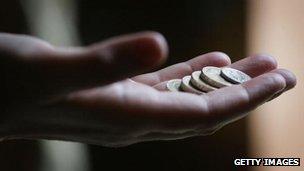UK wages decline among worst in Europe
- Published
- comments

One think tank said this year that the drop in wages was "unprecedented"
Wages in the UK have seen one of the largest falls in the European Union during the economic downturn, according to official figures.
The figures, which were requested by the Labour Party and collated by the House of Commons library, show average hourly wages have fallen 5.5% since mid-2010, adjusted for inflation.
That is the fourth-worst decline among the 27 EU nations .
By contrast, German hourly wages rose by 2.7% over the same period.
Across the European Union as a whole, average wages fell 0.7%.
Only Greek, Portuguese and Dutch workers have had a steeper decline in hourly wages, the figures showed.
Other countries that have suffered during the eurozone debt crisis also fared better than the UK. Spain had a 3.3% drop over the same period and salaries in Cyprus fell by 3%.
French workers saw a 0.4% increase, while the 18 countries in the eurozone saw a 0.1% drop during that period.
'Worse off'
"These figures show the full scale of David Cameron's cost of living crisis," said shadow Treasury minister Cathy Jamieson.
"Working people are not only worse off under the Tories, we're also doing much worse than almost all other EU countries.
"Despite out-of-touch claims by ministers, life is getting harder for ordinary families as prices continue rising faster than wages."
But the government says it has tackled the higher cost of living by raising the tax-free personal allowance threshold to £10,000, taking 2.7 million people out of tax, and other measures such as freezing fuel duty.
"The economy is on the mend, but we've still got a long way to go as we move from rescue to recovery and we appreciate that times are still tough for families," a Treasury spokesperson said.
BBC political correspondent Ben Wright said: "With an economy that now seems to be gathering momentum, one of the key arguments that Labour have been making for the last two years - the government got this wrong, their economic prescription failed - is no longer as powerful a message at it was six months or a year ago."
"Which is why we are hearing a lot today about living standards."
"Labour think that if a recovery is in place but is not being felt in people's pockets, then it's not going to do the government much good at all," he said.
The GMB union said the government was "directly responsible" for the fall in wages.
"Employers paying low wages get taxpayer subsidies in the form of tax credits to assemble a workforce for them to make decent profit margins," it said.
In June, the Institute for Fiscal Studies said that a third of workers who stayed in the same job saw a wage cut or freeze between 2010 and 2011 amid a rise in the cost of living.
"The falls in nominal wages... during this recession are unprecedented," the IFS said at the time.
In 2009, the average public-sector worker earned about £16.60 per hour, which dropped to about £15.80 in 2011, the IFS said.
Meanwhile, hourly pay for private-sector workers in 2009 was just over £15.10 and dropped to about £13.60 in 2011.